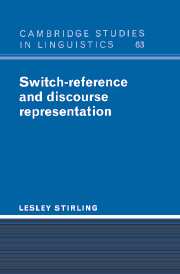Book contents
- Frontmatter
- Contents
- Preface
- List of abbreviations
- 1 Switch-reference phenomena
- 2 Functional extensions of switch-reference systems
- 3 Theoretical conceptions of switch-reference
- 4 Discourse Representation Theory and Unification Categorial Grammar
- 5 A Discourse Representation Theory account of switch-reference
- 6 Logophoricity
- Notes
- References
- Index
6 - Logophoricity
Published online by Cambridge University Press: 07 December 2009
- Frontmatter
- Contents
- Preface
- List of abbreviations
- 1 Switch-reference phenomena
- 2 Functional extensions of switch-reference systems
- 3 Theoretical conceptions of switch-reference
- 4 Discourse Representation Theory and Unification Categorial Grammar
- 5 A Discourse Representation Theory account of switch-reference
- 6 Logophoricity
- Notes
- References
- Index
Summary
Introduction
Logophoricity was introduced in chapter 1, where I tried to establish criteria for deciding whether or not some given set of linguistic phenomena constitutes a switch-reference system. There, I presented data from the African languages Igbo and Gokana, taken from Hyman & Comrie (1981) and Comrie (1983). Hyman & Comrie (1981) identify the Gokana data as a logophoric system, but Comrie (1983: 32, 36) calls it a ‘young switch-reference system’. He thereby draws attention to the similarities between switch-reference and logophoricity, and also raises the possibility of logophoric systems developing into switch-reference systems. In chapter 1, I argued that despite these similarities, and potential diachronic analyses of the data, we should maintain a clear distinction between switch-reference and logophoricity, and analyse the Gokana system as an instance of the latter rather than the former.
Recently, logophoricity has been the focus of renewed interest by linguists, due to analogies which have been drawn between the logophoric systems described for African languages, and ‘non-clause-bounded’, or ‘long-distance’ reflexives, which have received considerable discussion for some Scandinavian languages (Thráinsson 1976, Maling 1984, Barnes 1985, Hellan 1987), Japanese (Kuno 1972, 1988) and Italian (Giorgi 1984), and which have also been reported for a wide range of other languages, including Northern Porno (O'Connor 1986), Malayalam (Monahan 1982), and the Caucasian languages Chechen and Ingush (Nichols 1985) (see also the collection of papers in Koster & Reuland 1991). The basis for these comparisons is that the use of reflexive pronouns with clause-external antecedents in these languages seems to be restricted to just those semantically defined contexts in which logophoric pronouns may occur.
- Type
- Chapter
- Information
- Switch-Reference and Discourse Representation , pp. 252 - 307Publisher: Cambridge University PressPrint publication year: 1993



